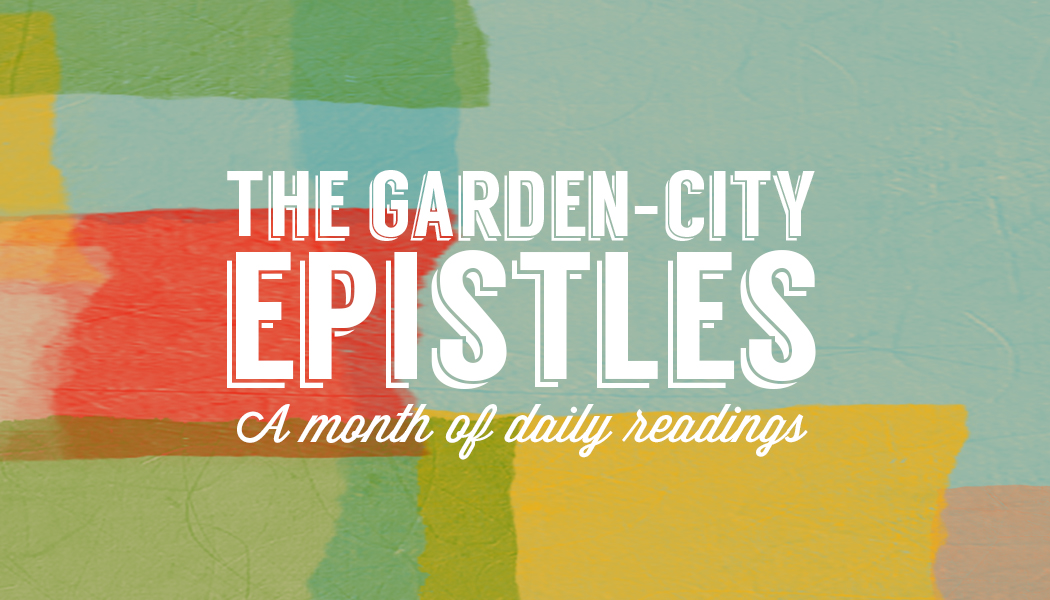This letter was written to Ken Brewer, chair of the Religious Studies department at Spring Arbor University. Ken’s the guy who helps me get theologically un-stuck.
The Bible is full of metaphors, and keeping them straight is a challenge (to say nothing of the challenge inherent in reconciling those metaphors to one another). And, strictly speaking, not all the metaphors are only metaphorical. Heaven, for example, refers to the skies,[1] the stars,[2] the place where God rules Creation,[3] and the future destination of sanctified humanity.[4]
You understand these nuances, but you’re also honest enough to admit they’re a little dizzying. You know how important they are, and how much they affect our way of thinking about God and about our lives with God, both now and later on; but you still smirk when you’re forced to delineate all the intricacies of heaven.
One of my earliest challenges with city theology was trying to discern how the City, the Kingdom, and Heaven overlapped while remaining unique. Clearly all three are metaphorical ways of understanding God’s space and God’s people living in God’s way; but, if that is all they are, why did God bother giving us so many different metaphors to begin with?
Part of the answer, surely, is diversity. God loves language and, if the scriptures are any indication, he enjoys saying things over and over in as many ways as possible. He’s clever. Part of the answer must also be as some kind of failsafe, meaning God supplied multiple metaphors to make sure we’d find something we could understand. But the final part of the answer, the part that you always assumed was there, indicated that each of these metaphors offered something special, some unique angle that helps us understand one aspect or another about life with God.
The city is about cooperation. Heaven is about the saturation of God’s presence. The Kingdom is a metaphorical way of denoting our ruling activity with Christ, under Christ.
George Eldon Ladd’s classic theological work The Gospel of the Kingdom[5] introduces us to the concept of already-not-yet. He uses plain language and common sense to talk about the fact that we are already living in God’s kingdom on-earth-as-it-is-in-heaven,[6] but we don’t yet fully experience all the benefits therein. We live in a time between times, where God’s rule and reign are constantly breaking into this world with miraculous power and demonstrations of supernatural authority. Just not always. We’re already living in God’s kingdom, but we’re not yet full-time residents of heaven.
I think if the kingdom was the only metaphor we had to understand how God works and what God wants, we’d err on the side of spiritual lethargy. We’d pray, throwing our hands up in the air, resolving that if God wanted to do something he could. Or not.
The Kingdom was Jesus’ favorite means of talking about God’s plans to heal the world, promising that there would come a time when the kingdom of our world will become the kingdom of our God.[7] The Kingdom was Jesus’ mission statement. Yet he also spoke of the city, and in Revelation we’re told the city descends like a bride for Christ.[8]
The truth is, whatever authority we have comes from God and proceeds because he’s the King in the ultimate Kingdom; but our knowledge of the city helps us to also understand that the King isn’t looking for ladies-in-waiting, but knights errant.
Christ doesn’t want to rule alone.
[1] Genesis 1.7.
[2] Isaiah 40.26.
[3] Psalm 103.19.
[4] Philippians 3.20-21.
[5] George Eldon Ladd, Gospel of the Kingdom: Scriptural Studies in the Kingdom of God, (Grand Rapids, MI: Wm. B. Eerdmans, 1990).
[6] Matthew 6.10.
[7] Revelation 11.15.
[8] Revelation 21.2.
fossores
Related posts
Categories
Category Cloud
Tag Cloud
Recent Posts
- Victors and Victims November 6, 2018
- 3 Hacks for Happiness October 29, 2018
- Hope Against Death September 20, 2018
- The Shape Of The Cross September 19, 2018


